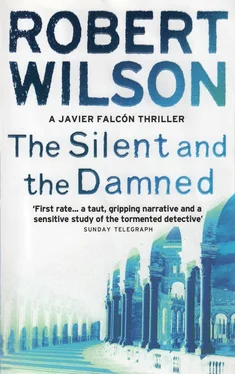'Did you think he was a danger to himself?'
'Obviously I didn't. Mental disturbances of the sort he was suffering are not uncommon. I have to make decisions on the basis of a snapshot of a man's life. He was not extremely agitated, nor was he preternaturally calm – those two extremes being indicators of danger.
There was no history of depression. He had come to me from someone else. He seemed to be trying to tackle his problem. He wanted something to reduce his level of anxiety and he didn't want another panic attack. These are all positive signs.'
'It sounds as if he wanted a quick fix. No therapy.'
'Men are more resistant to the idea of discussing their private thoughts or shameful deeds with someone else,' said Rodríguez. 'If their problems can be solved with a pill, so much the better. There are plenty of doctors who believe we are bundles of chemicals and that psychopharmacology is the answer.'
'So, in your opinion, Sr Vega was troubled but not suicidal?'
'It would have been good to have known about his wife,' said Rodríguez. 'If you have pressure at work and no respite at home and possibly no love… that is a situation that can tip a troubled mind into despair.'
Falcón sat wedged into the corner of the car, Ferrera driving. He was already questioning his instincts on day two of the investigation. So far there was no conclusive evidence to support a murder inquiry. The suicide option was looking stronger with every interview. Even if there were no matching fibres from the pillow found under Sr Vega's fingernails that was still only an indicator that somebody else might have been there. It wasn't positive proof.
Ramírez called from the offices of Vega Construcciones to say that Sergei was a legal immigrant and Serrano and Baena now had a photograph and were circulating with it around Santa Clara and the Poligono San Pablo.
The Cabellos lived in the penthouse of a block built in the seventies in the upmarket barrio of El Porvenir, opposite the bingo hall on Calle de Felipe II.
'You're never too rich to play bingo,' said Falcón, as they went up to the apartment where Carmen Ortiz was having a hysterical attack. She was in the bedroom with her husband, who had arrived from Barcelona that morning. The Ortiz children, with Mario between them, were sitting on the sofa, subdued. It was the old man, Sr Cabello, who'd answered the door. He led them into the sitting room. Ferrera knelt down with the children and had them playing and giggling in a matter of moments. Sr Cabello went to find his daughter but returned with his son-in-law. They went into the kitchen.
'She doesn't want to see the bodies,' said the son- in-law.
'They'll be behind a glass panel,' said Falcón. 'They'll look as if they're asleep.'
'I'll go,' said Sr Cabello, composed and determined.
'How is your wife?' asked Falcón.
'Stable, but still in intensive care, unconscious. I'd appreciate it if you could take me to the hospital afterwards.'
Falcón sat in the back of the car with Sr Cabello while Ferrera took on the pre-lunch traffic. The old man rested his worker's hands in his lap and stared straight into the intricacies of Ferrera's pinned-up plait.
'When was the last time you saw Lucia?' asked Falcón.
'We were there for Sunday lunch.'
'With Sr Vega?'
'He came for lunch. He'd been out driving his new car.'
'How was your daughter?'
'I think you already know by now that she was not well. She has not been well since Mario was born,' he said. 'It was never easy to see her in that state, but there was nothing extraordinary about that particular lunch. It was the same as always.'
'I am going to have to ask you some questions which might be painful,' said Falcón. 'You are the closest family and it is only through you that we can begin to understand the domestic situation between your daughter and Sr Vega.'
'Did he kill her?' asked Sr Cabello, turning his wounded eyes on Falcón for the first time.
'We don't know. We're hoping for clarification from the autopsy. Do you think he could have killed her?'
'That man was capable of anything,' said Sr Cabello, with no drama, mere fact.
Falcón waited in silence.
'He was a cold man,' said Sr Cabello, 'a ruthless man, a man that never allowed anyone too close. He never talked about his dead parents, or any member of his family. He did not love my daughter, even before her problems when she was a beautiful young woman… when… when she…'
Sr Cabello closed his eyes to memories, his jaw muscles worked over his grief.
'Were you aware of any difference in your son-in- law's behaviour since the beginning of this year?'
'Only that he was even more withdrawn than usual,' said Sr Cabello. 'Whole meals would pass in silence.'
'Did you remark on it?'
'He said it was work, that he was managing too many projects at once. We didn't believe him. My wife was sure he had a woman somewhere and it had all gone wrong.'
'Why did she think that?'
'No reason. She's a woman. She sees things I don't see. She sensed that the trouble was in the heart and not the head.'
'Was there anything specific that led you to believe that he had a mistress?'
'He was not often at home with Lucia. She would go to bed before he arrived back from whatever he was doing and sometimes he would be gone by the time she woke up,' said Sr Cabello. 'So there was that, and the way he had always been with our daughter.'
'His neighbours said that Mario appeared to be very ' important to him.'
'That is true. He was very fond of the boy… and Lucia found it difficult to cope with his energy as that puta of a disease took hold of her mind,' said Cabello. 'No, I don't say that he was all bad, and certainly he would not have appeared bad to an outsider. He understood the necessity for charm. It was only by living close to him that you saw his true nature.'
'When did you spend time with him?'
'On holidays down at the coast. He was supposed to be relaxed then, but in many ways he was worse. Constant company made him uneasy. I think the idea of family made him sick.'
'Do you know what happened to his parents?'
'He said they were killed in a car accident when he was nineteen years old.'
'You know more than his lawyer.'
'He wouldn't tell Carlos Vázquez that sort of thing.'
'He told him that his father had been a butcher,' said Falcón. 'And how he used to punish him.'
'You've seen the room he has in his house,' said Cabello. 'He gave Carlos Vázquez an explanation. He never told me what his father had done to him. You see, he is not a normal man. He is at heart a suspicious man, because he believes that people are like he is himself.'
'Lucia didn't like the butchery?'
'That only started after Mario was born. Before then she didn't mind.'
'Were you surprised that she wanted to marry him?'
'It was a difficult time.'
They were stopped at a traffic light. An African boy walked between the cars, hatless in the full sun, selling newspapers. Sr Cabello seemed to need movement to get himself talking. The lights changed.
'As I told you, Lucia was a beautiful woman,' said Cabello, embarking on a story that he'd built inside himself over years. 'There was no shortage of men who wanted to marry her… and she married a man whose father had a large farm outside Cordoba. They went to live in a house on the farm and they were very happy, until Lucia did not conceive. She went for tests. They told her that there was nothing wrong with her and that perhaps they should consider IVF. The husband refused. Lucia always thought that he was afraid to find that he had a problem. Things were said in the heat of the moment that could not be undone and the marriage was dissolved. Lucia came back to live with us. She was twenty-eight years old by now and had missed out on the best of her generation.
Читать дальше
Конец ознакомительного отрывка
Купить книгу












